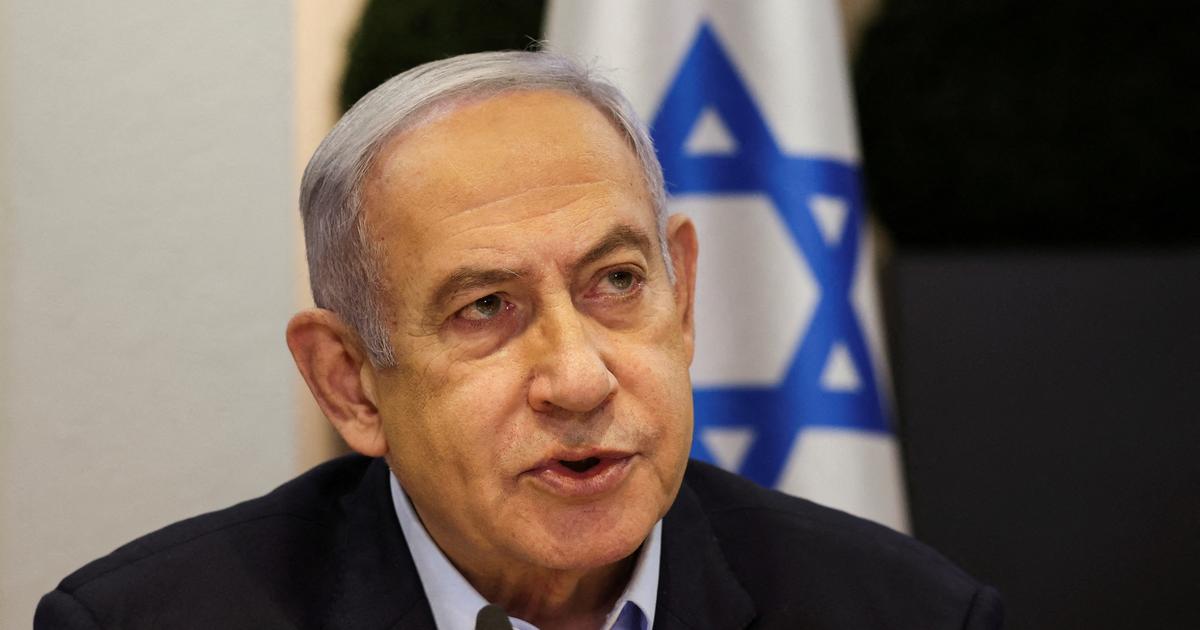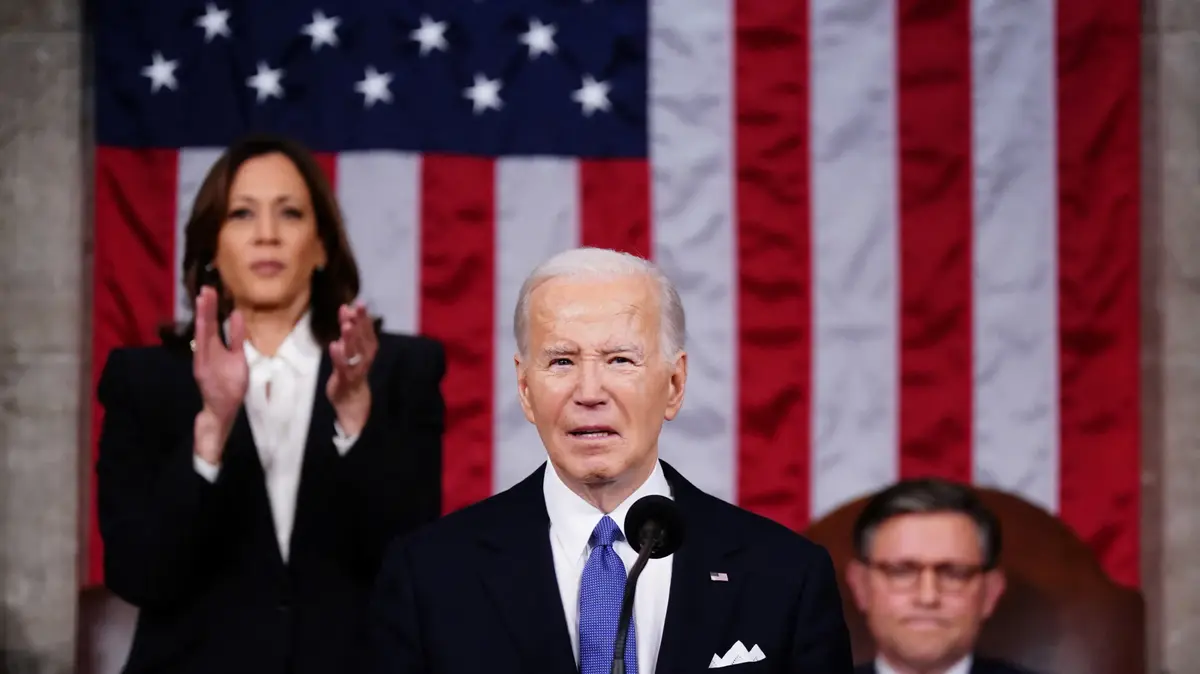Orit Pinhasov is strongly opposed to the judicial reform that the Israeli government of
Benjamin Netanyahu
has proposed , but you won't find her anywhere near the mass protests against the plan.
Her marriage, she points out, depends on it.
Pinhasov's husband is on the other side of Israel's political divide, and joining the protests would only increase tensions that seem tangible to him at home.
“I don't go to the demonstrations, not because I don't believe in them,” he said.
“I am not going to protect my home.
I feel like I'm fighting for my home."
Israel turns 75 and has a lot to celebrate.
But instead of celebrating its achievements as a military and economic power in the region, the country that rose from the ashes of the Holocaust is facing perhaps its greatest existence to date, not by external enemies but by internal divisions.
Tens of thousands of Israelis wave their national flag during a protest against the plans of the government of Prime Minister Benjamin Netanyahu.
AP Photo
the divisions
In the last three months,
tens of thousands of people have taken to the streets
against what they perceive as an attack by a religious and ultranationalist government on a national identity rooted in liberal traditions.
Fighter pilots have threatened not to report to their posts.
The country's leaders have openly warned of the risk of civil war, and families of fallen soldiers have called on politicians to stay away from remembrance ceremonies.
Many Israelis wonder
if the huge divide will ever be able to heal.
Miri Regev, the government minister in charge of the main celebration, has threatened to expel anyone who interrupts it.
The event was held in a square near the Israeli national cemetery in Jerusalem, where the country will transition abruptly from solemn
Remembrance Day
ceremonies paying tribute to fallen soldiers to the joy of Independence Day, with a symbolic ceremony of torch lighting, military marches and music and dance performances.
Opposition leader Yair Lapid did not attend the ceremony.
"You
have torn Israeli society apart
and no fake fireworks show can hide it," he said.
Israeli Prime Minister Benjamin Netanyahu in Parliament.
Photo EFE
The differences are so vast that Israel's oldest and perhaps most pressing problem - its continued military rule over the Palestinians -
is barely mentioned
, despite a recent uptick in violence.
Even before the protests broke out, public messages on the issue were mostly limited to military interventions in the conflict and not the future of the territories captured by Israel in the 1967 Six-Day War, which the Palestinians claim. to form a state.
Benjamin Netanyahu, a divisive leader revered by his followers and disowned by his opponents,
has played a key role in the crisis
.
The divisions gained steam when he was charged with various corruption offenses in 2019. Israel went through five election cycles in four years, revolving around whether Netanyahu was fit to rule.
Late last year, the president finally scored a victory by forming
the most conservative government in the country's history
.
Within days, the executive was working to reform the judicial system and give Netanyahu's allies the power to overturn judicial decisions and appoint judges.
Relatives of prisoners release pigeons during a demonstration in solidarity with Palestinians held in Israeli jails, in Gaza.
Photo EFE
The plan, which critics see as a clear attempt to grab power, has sparked unprecedented protests that eventually forced Netanyahu to
halt the initiative
.
In a reflection of the deep mistrust in the country, the marches have only grown, exposing deeper cracks in Israel's society that have remained open for decades.
In Netanyahu's camp is
a religiously and socially conservative coalition
that includes the ultra-Orthodox minority who wield great political influence, religious nationalists like settlers from the West Bank, and Jews of Middle Eastern descent who live in working-class populations outside the big cities.
Those protesting against him are largely
secular middle-class professionals
who have fueled Israel's modern economy.
They include high-tech workers, teachers, lawyers, and current and former commanders of security forces.
Israel's Palestinian minority, for its part, has stayed out of the protests, saying it
never really felt like part of the country.
Those divisions have carried over to workplaces, friendships, and families.
In peace
Despite political differences, Pinhasov, 49, said she and her husband
have "lived in peace" for 30 years
.
There were discrepancies at election time every few years, she pointed out, but they were brief and unimportant.
That began to change during the coronavirus pandemic, when Pinhasov said the tone of the public debate around issues like lockdowns and vaccines
became more aggressive
.
Then, as Israel went from one election to another, tensions began to show at home.
Her husband told her that he had been
“brainwashed”
and complained about the “leftist” media, she explained.
When she disagreed, he would tell her “you don't understand”.
They could no longer watch the news together or “Wonderful Country,” a popular political satire show.
His four children, including a 21-year-old son who shares his father's views, love and respect each other and their parents, he said.
But it's complicated, like “walking through a minefield”.
Although Israel often unites in times of war,
the seeds of mistrust were sown decades ago.
Key dates
From the country's earliest days, the Jewish majority
was riddled with disagreements
over issues such as whether to accept reparations from postwar West Germany, violent protests by poorer Jews in the Middle East in the early 1970s, and bitter internal divisions over fiascoes. military in the 1973 Yom Kippur War and later in Lebanon.
Prime Minister Yitzhak Rabin
was assassinated
by an ultranationalist Jew in 1995 who opposed his peace efforts with the Palestinians.
When Israel withdrew from the Gaza Strip in 2005, there were huge protests.
“Israel was always a very divided society, but somehow it held together,” explained Tom Segev, an Israeli journalist, historian and author.
"The difference now is that we are actually
discussing the basic values
of this society."
The protests against the Netanyahu government show that many are "really scared" about the future of the country, he said.
Tel Aviv University economist Dan Ben-David, president of the Shoresh Institution for Socioeconomic Research, points to two crucial points in Israel's history, the 1967 and 1973 wars.
The 1967 Six-Day War, in which Israel captured the West Bank, Gaza Strip and East Jerusalem,
gave rise to the Jewish settler movement,
which has grown into a powerful political force representing some 700,000 people.
For its part, the Yom Kippur War triggered a process that would bring the conservative Likud party to power four years later.
Likud
has ruled most of the time
since then, usually in collaboration with ultra-Orthodox parties.
Those religious parties have used their political power to win generous subsidies and controversial exceptions to military service, angering the larger secular population.
The ultra-Orthodox community, and to a lesser extent the nationalist religious community, run parallel education systems that offer lower-quality education
with little regard for democratic values
such as minority rights, Ben-David said.
Since these communities have high birth rates, the country must return to a model that includes a common agenda that defends universal values, he said.
"If we are a nation, then we must teach our children what holds us together."
Danny Danon, a former ambassador to the United Nations and a leading member of Netanyahu's Likud party, said the anniversary was a time for everyone to reflect and
think about what they have in common.
“In my five years at the United Nations I realized that our enemies do not distinguish between left and right, secular and orthodox,” he said.
"That's why we have to realize that we have to stick together."
Even so, many saw the 75th anniversary celebrations as a time of joy.
Pinhasov said she would host a party for about 100 people at her home in central Israel, many of them members of her husband's family.
“It's our Independence Day,” he said.
"It's still a day of celebrations."
PA Agency
bp
look also
Interview with former Israeli Foreign Minister Shlomo Ben Ami: "For Netanyahu, power is his sexual scent"
Israel and company: What is this Justice in the dock?







